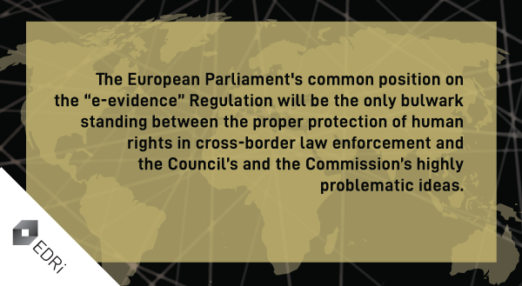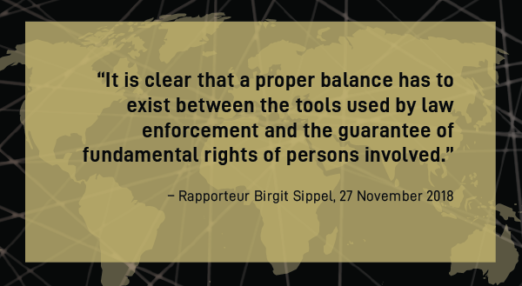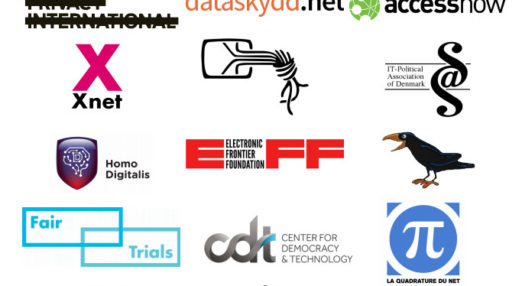cross-border access to data
Filter by...
-

E-evidence and human rights: The Parliament is not quite there yet
The European Parliament Committee on Civil Liberties (LIBE) is currently busy working out a compromise between its different political groups in order to establish a common position on the “e-evidence” Regulation.
Read more
-

Click here to allow notifications in cross-border access to data
From a fundamental rights perspective, it’s essential that the proposal enabling cross-border access to data for criminal proceedings (“e-evidence”) includes a notification mechanism. However, this requirement of a notification seems to be out of the question for those advocating for “efficiency” of cross-border criminal investigations, even if that means abandoning the most basic procedural safeguards […]
Read more
-

Double legality check in e-evidence: Bye bye “direct data requests”
After having tabled some 600 additional amendments, members of the European Parliament Committee on Civil Liberties (LIBE) are still discussing the conditions under which law enforcement authorities in the EU should access data for their criminal investigations in cross-border cases. One of the key areas of debate is the involvement of a second authority in […]
Read more
-

“E-evidence”: Repairing the unrepairable
On 11 November 2019, Member of the European Parliament (MEP) Birgit Sippel (S&D), Rapporteur for the Committee on Civil Liberties, Justice and Home Affairs (LIBE) presented her draft Report, attempting to fix the many flaws of the European Commission’s “e-evidence” proposal. Has Sippel MEP been successful at repairing the unrepairable? The initial e-evidence proposal by […]
Read more
-

EU rushes into e-evidence negotiations without common position
On 6 June 2019, the Justice and Home Affairs Council (JHA) – which gathers all EU Member States Ministers of Justice – asked the European Commission to start international negotiations on cross-border access to electronic evidence in criminal matters (so-called “e-evidence”) in the upcoming months. The Commission should enter into bilateral negotiations with the United […]
Read more
-

Cross-border access to data for law enforcement: Document pool
The European Commission proposed a Regulation on cross-border access to and preservation of electronic data held by service providers and a Directive to require service providers to appoint a legal representative within the EU in April 2018. Since then, the legislative process to adopt them has been fast-tracked, which has prevented any proper assessment of […]
Read more
-

LIBE Committee analysis: Challenges of cross-border access to data
On 7 February, the European Parliament Committee on Civil Liberties, Justice and Home Affairs (LIBE) presented two new working documents analysing further the issue of cross-border access to data in criminal matters, also known as “e-evidence”.
Read more
-

EU Council’s general approach on “e-evidence”: From bad to worse
On 7 December 2018, the Justice and Home Affairs Council (JHA) adopted its general approach – a political agreement before entering into negotiations with the European Parliament – on the proposal for a Regulation on European Production and Preservation Orders in criminal matters. The initial proposals of the European Commission already raised concerns in terms […]
Read more
-

Growing concerns on “e-evidence”: Council publishes its draft general approach
On 30 November 2018, the Council of the European Union published a draft text for its general approach on the proposal for a regulation on European Production and Preservation Orders in criminal matters – also known as “e-evidence”. The text is to be adopted by EU Member States, represented in the Council.
Read more
-

Independent study reveals the pitfalls of “e-evidence” proposals
The conclusion of the study could not be clearer: “The added value of the new cooperation regime (quick and effective access to provider data) is mainly based on the abolition of cooperation obstacles and procedures ensuring effective protection of fundamental rights.”
Read more
-

New Protocol on cybercrime: a recipe for human rights abuse?
From 11 to 13 July 2018, the Electronic Frontier Foundation (EFF) and European Digital Rights (EDRi) took part in the Octopus Conference 2018 at the Council of Europe together with Access Now to present the views of a global coalition of civil society groups on the negotiations of more than 60 countries on access to […]
Read more
-

EU “e-evidence” proposals turn service providers into judicial authorities
Today, 17 April, the European Commission unveiled two proposals: a Regulation on cross-border access to and preservation of electronic data held by service providers and a Directive to require service providers to appoint a legal representative within the EU. The core of the Commission’s “e-evidence” initiative is that national judicial or administrative bodies can ask […]
Read more
